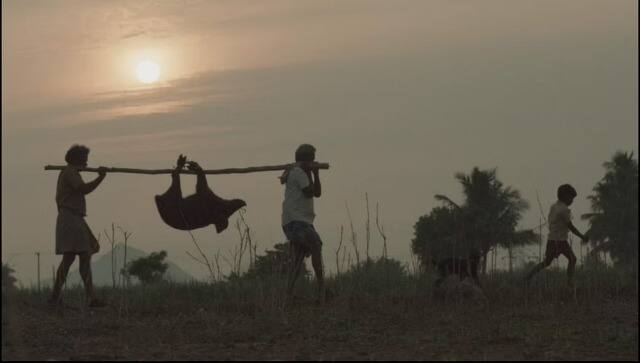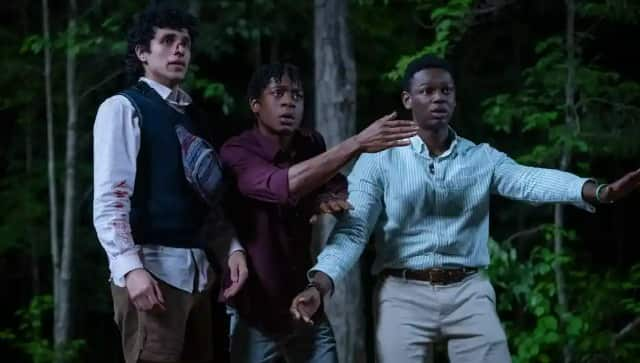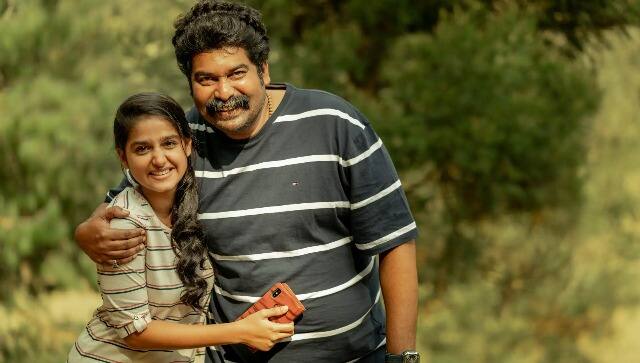The cinematic experience need not always be positive and pleasant for all concerned. I wonder how much fun Shyam Benegal had while making Nishant. Or Shekhar Kapur during the making of Bandit Queen : did he enjoy himself making this as much as Mr India ? Thamizh ’s debut film Seththumaan in Tamil is a very strange film. Strange and disquieting in a raw and direct quasi-documentary way, it addresses the theme of caste oppression which seems to haunt many filmmakers in the South. Unlike Vetrimaan ’s Visaaranai where disempowered men are picked up by cops and tortured for days to confess to a crime they did not commit, Seththumaan doesn’t go into the ‘them’ and ‘us’ logistics of class segregation. The film is set in an impoverished village where the caste lines are blurred; the difference between the upper and lower caste is that one is poor and the other is very poor. Meat politics defines this raw and if I say so, undercooked film. I found the treatment and execution of caste politics in Seththumaan way too direct. The aesthetics here are down to almost nil. Director Thamizh has used no filters, no guidelines of graceful storytelling as we first meet Poochiyappa (Manickam) and his grandson Kumaresan (Ashwin Shiva). Instantly the bond between the old man and the child is established. It is a primeval pleasure to treasure to see the pair so happy together. The extraneous heat seeps into the core relationship between the grandfather and the boy from the start when we are told that the boy’s parents were killed in a food feud. In the graphics that accompany the opening titles, we see the whole carnage where Kumaresan’s parents lose their life. This illustrative preamble seems more like a budgetary compromise than a creative decision. Quite frequently as I watched this parable on pork politics, I felt the director was using poverty as a living character and a breathing catalyst rather than a notion. While a sense of irredeemable despair runs through the tale of two outcasts Dada-and-grandson who are bonded by their mutual love, the director seems to use cost-cutting cinematic techniques such as handheld camera (wobbling its way through a mound of caste-ridden crisis) more out of budgetary constraints than creative compulsion. [caption id=“attachment_10783581” align=“alignnone” width=“640”]  A still from Seththumaan[/caption] Like many small-budgeted neo-realistic films Seththumaan insists on assaulting our senses with the most primeval sounds and visuals. A large part of the narrative dynamics have to do with the slaughter of a pig, as two factions of pork eaters wage a battle that seems to echo the blood-curdling screams of agony of the pig on slaughter. While I watched this grotesque sequence I thought, what price realism? Not much I guess. Getting a pig and slaughtering it on camera and getting applauded for being so realistic is part of a certain faction of filmmaking that focuses on fractured dreams so intently that it forgets how difficult it is for the audience to stay connected to a film that insists on showing bodily fluids functions and appetites so intently. We never know when our admiration turns into repulsion, and vice versa. I can’t say I enjoyed Seththumaan. It’s like expecting enjoyment in watching an execution, or a slaughter. This is a film that you may embrace with all its excesses of realism or reject for the same reason. But the basic condition of scrounging for a living that the underdogs face, won’t go away. Take it or leave it. Emergency , an Amazon original feature film adapted from a short story of the same name, addresses race relations in America with a directness that the makers of the Tamil film Seththumaan would approve of. It is a film simmering with an inner rage at White attempts to create an impression of racial impartiality when in truth there is inequality bias and slur everywhere. [caption id=“attachment_10783601” align=“alignnone” width=“640”]  A still from Emergency[/caption] We hear you. We get the point. There is a disarmingly natural charm to the film’s partly-coherent efforts to show how racism is not just a thought but a way of life in America. The fear of two black students being caught by (white) cops after they agree to help an overdosed young white woman, is dealt in the film with wicked humour and arresting irony. Much as I liked the film’s mix of the pukey and the puckish I found the narrative simmering in its own disconnect, wallowing in the vomit, so to speak. There is this nauseating plot point where one of the protagonists drops his phone in the unconscious girl’s vomit. We are then made forced witnesses to the phone being rescued from the vomit. Eeeew. If we overlook this equating of bodily fluids with realism, Emergency is quite an adventurous ride, what with the three black-brown protagonists hellbent on doing the right thing with the white girl in the backseat. RJ Cyler as Sean, Donald Elise Watkins as Kunle, Sebastian Chacon as Carlos are a treasurable trio of natural performers. I specially like Chacon’s sleepy-eyed closet-dogooder act. And yes, the rest of the cast is rather fresh and effective too. But I don’t think the director Carey Williams was sure as to how to end the bumpy night ride. The narrative simply groans to a halt. Everyone gets to go home and racism has for now been defeated. Emergency misses being a vital statement on race relations in America. It has the potential of being as explosive as a Spike Lee film, but the director chooses to tone down the political dynamics of skin pigmentation to make the theme palatable to a younger audience which doesn’t mind a film that addresses racism but would rather not get too deep into it. At the start of the film, I was startled by a teacher discussing the genesis of the taboo ‘N’ word in the black lexicon. I couldn’t make out whether the episode was mocking the teacher’s lack of irony in understanding the black presence in American history. There are many problematic areas in Emergency where the immersive politics in the race debate seems to dominate the director’s thought processes. Director Carey Williams could have been Spike Lee. He chooses to be Sidney Pottier. In the truly heartwarming Malayalam film Aviyal, the ever-dependable Joju George plays the present-day version of the protagonist’s character Krishnan, while in the rest of the excursive narrative a new actor Sirajudeen Nazar goes through four stages in Krishnan’s life, from school crush (which crushes his self-esteem) to a young adult in a housing colony of Kannur who tries to establish an illicit relationship with a wife and mother. This episode shows Krishnan’s moral bankruptcy most tellingly. [caption id=“attachment_10783611” align=“alignnone” width=“640”]  A still from Aviyal[/caption] The writer-director Shanil doesn’t hesitate in damning his protagonist. In this, he is one with Krishnan who doesn’t mind opening up on his troubled and misogynistic attitude to his daughter, although he is shown doing almost nothing most of the time except playing the guitar and trying to get intimate with various women. In the Goan episode, reminiscent of the Telugu hit Arjun Reddy with the hero’s hair and beard grown larger than his sexual arrogance, Krishnan befriends a footloose thought, not a frenzy-free woman who tells Krishnan to eff off after some serious sex. This episode struck me as a comment on the pretentious gangs of whatasapp-pur who spend their parents’ money living a dream, smoking pot and having sex with anyone who cares to. I am not sure if such people actually exist or are they illustrative of a new-age dislocation in pop art? There is a sequence in a pub where Krishnan is shown playing a gentle ballad by the Carpenters. No one is paying him any attention until he breaks into a Jimi Hendrix track. This is what the writer-director does. He knows the normal route won’t get him anywhere. So he steps on the gas, lets his protagonist fly straight into the muck. Newcomer Sirajuddin Nazir puts in a startling amount of transformative energy into his character, especially in the physical sense. We literally see Krishnan transform in front of us, from a gawky adolescent to a cocky 20-something to a zonked out 30-something singing hard rock in Goa (how much more pretentious can you get!) to finally an uneasily married man, whose wife is lovely patient woman quietly observing her husband’s plummeting fortunes and morals. The impunity with which Krishnan steals from his wife’s purse would leave many numbed with shame and rage. Not Krishnan. Aviyal allows him to dig his own grave and lie in it. Admirably the film makes no judgement on Krishnan’s creepily low-life character but waits for him to redeem himself. When it finally happens, it’s not too late. The screenplay gives Krishnan a second chance and towards the end he get to articulate the film’s best line about his failed marriage: “All my life I ran after a woman who didn’t love me. When I finally found a woman who loved me, I didn’t love her back.” Rather than dwell in the world of regret and shame, Aviyal speaks of hope and redemption. This is its greatest asset. We forgive its uneven texture and erratic switchovers from phase to phase because, well, life is like that. Nothing comes in a straight line. Subhash K Jha is a Patna-based film critic who has been writing about Bollywood for long enough to know the industry inside out. He tweets at @SubhashK_Jha. Read all the Latest News , Trending News , Cricket News , Bollywood News , India News and Entertainment News here. Follow us on Facebook, Twitter and Instagram.
Thamizh’s Seththumaan is strange and disquieting in a raw and direct quasi-documentary way, it addresses the theme of caste oppression which seems to haunt many filmmakers in the South.
Advertisement
End of Article
Written by Subhash K Jha
Subhash K Jha is a Patna-based journalist. He's been writing about Bollywood for long enough to know the industry inside out. see more


)

)
)
)
)
)
)
)
)



